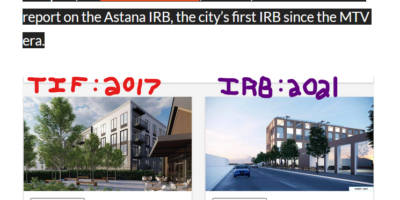By Ian Epperson
Last year the world’s leaders gathered in Copenhagen to come up with a solution to the looming specter of climate change. The conference was called COP16. As a hopeful world watched the COP16 talks fall apart, our very own Commerce Lexington, an economic development group, announced the arrival of a new and aggressively pro-coal attitude that would be reflected in its policy decisions.
Here’s a brief overview of the revamped attitude toward coal reflected in Commerce Lexington’s Public Policy Statement for 2010 regarding energy and the environment. It includes 11 energy and environmental goals, some of which sound reasonable and environmentally sound. Of note are goals late in the list:
The 9th goal down the list is to “Encourage and secure research grants and opportunities for our state’s postsecondary institutions to develop technology and infrastructure needed for alternative fuels and energy.”
The 7th goal is to “Diversify utility portfolios through voluntary renewable energy programs such as landfill gas, biomass, wind, hydro and solar, if possible.”
But these appear to take a back seat to goals at the top of the list. The first reads: “Maintain the production of affordable, reliable energy.” In other words, continue the production/extraction of coal. The second goal reads: “Protect the viability of Kentucky’s coal industry—including preserving the direct and indirect jobs that the industry provides statewide.”
The platform is so blatantly pro-coal that references to alternative energy sources are prefaced by words such as “voluntary” or qualified by phrases like “if possible.” Even the images accompanying Commerce Lexington’s Energy Policy Statement are pro-coal: a photo of a locomotive hauling train cars full of coal and a photo of a delegation of Lexington business leaders standing atop a “reclaimed” mountaintop removal site.
So, what’s more embarrassing than your city’s Chamber of Commerce heralding coal, the dirtiest form of energy out there, at the same time world leaders were convening to reduce climate change brought on by our economic practices?
Answer: the fact that your city already has the largest per-capita carbon footprint in the country.
Coal and climate change
By now everyone over the age of fifteen knows that coal, as a source of energy, produces high volumes of greenhouse gas emissions which are the primary catalysts of climate change. With the world’s leaders prepared to gather in Cancun to discuss solutions once more for preventing runaway climate change, Kentucky sits at a crossroads between business as usual and new ways of producing cleaner energy—and pulling back from the brink of runaway climate change.
Unfortunately, many Kentuckians, and seemingly all of Kentucky’s elected leaders, are too satisfied to continue with business as usual.
For most of the world, climate change is no longer a debate, it’s accepted as a reality. The fact that Americans are still debating the reality of climate change or its manmade origins is not a testament to the validity of the science but rather a testament to the power that the energy industry has over the debate as companies like Exxon-Mobil spend millions to mold public opinion and lobby Congress.
In Kentucky, the coal industry is so powerful that public utilities are actually legally obligated to use coal. The Public Service Commission (PSC) requires that public utilities purchase the cheapest source of energy available, which is inevitably coal. In other words, if utility companies switch over to more expensive alternatives such as solar, wind or hydro power, they are in violation of Kentucky law. They can only offer renewable energy on a voluntary, customer by customer, basis as with KU’s hydroelectric blocks in which customers can pay $5.00 to feed 300 kilowatt hours of renewable energy into the grid.
The climate change debate in Kentucky always comes back to coal, and coal continues to be an extremely divisive issue.
Opponents of the coal industry include environmentalists as well as foes specifically of mountaintop removal. Environmentalists argue that coal pumps alarming amounts of carbon emissions into the atmosphere contributing to climate change. Opponents of mountaintop removal argue that this method of mining destroys a cultural landscape and pollutes streams and rivers by dumping debris containing heavy metal toxins into valleys and the headwaters of streams and rivers.
Supporters of the coal industry, including Commerce Lexington, point to the thousands of jobs that the coal industry maintains and the affordability of the energy it produces.
Unfortunately, this debate is just the small picture. Unless we make serious and significant investments in developing clean alternative forms of energy, we will continue to push the world toward the global cataclysm predicted as a result of runaway climate change. To quote Gwynne Dyer, author of Climate Wars, “The second half of the 21st century is shaping up to be a time in which none of us will want to live.”
This year alone we have seen massive flooding in Pakistan, major landslides in India and China, severe drought in Niger, and heat waves in the American Midwest. Prior to this year, Moscow’s all time record high temperature was 99 degrees in 1920. Over the course of two weeks in August 2010, that record was broken five times during a heat wave that resulted in the deaths of over 300 people per day. Meanwhile, a 100 square mile ice sheet broke off the northern tip of Greenland due to record warm temperatures in the Atlantic.
Seventeen countries have recorded their all-time high temperatures this year, more than any other year in history. And the world isn’t much closer to a solution than we were a year ago.
Climate Debt
While COP16 failed to decide on any meaningful steps to halt climate change, it did, however, introduce a new concept for those of us in the developed countries of the northern hemisphere (although its been discussed at length among leaders of poor countries in the southern hemisphere). That concept is known as Climate Debt, and it is one of the reasons COP16 fell apart.
Climate Debt is simply the acknowledgement that there is an inverse correlation between the countries that emit large volumes of greenhouse gases and the countries that will be most devastated by climate change.
In other words, climate projections show that the northern hemisphere, which contains most of the world’s developed countries, will be less impacted by climate change than the southern hemisphere. But, the northern hemisphere contains most of the world’s developed countries and therefore emits the most greenhouse gases. The southern hemisphere is expected to experience far more devastation because its countries will be unable to afford infrastructure mitigating the effects of climate change — unlike the northern hemisphere which will be able to afford new seawalls for coastal areas and irrigation systems for newly drought-prone regions.
Therefore, according to proponents of Climate Debt, the developed countries which are causing the problem should provide assistance to poor countries effected by the emissions of wealthy countries, but producing very few emissions of their own.
Even though U.S. representatives reject the idea of Climate Debt (no surprise really), Lexingtonians can do our part to pay our debt to the rest of the world. We have a long road ahead of us, but the good news is that we’re already heading in the right direction. Between 2000 and 2005, our population grew from 260,000 to 282,000. Yet, despite all those new cars on the road and new homes to heat, our emissions dropped by 0.71 metric tons per person compared to Louisville’s emissions, which rose by 1.43 metric tons per person.
We can start paying our debt by ending the behaviors that are causing the problem. That means pressuring Commerce Lexington to back off its aggressively pro-coal stance. Instead, Commerce Lexington should craft an energy policy that will make Lexington a national leader in environmentally friendly economic development, rather than dragging us kicking and screaming back to the early twentieth century. Next, we can demand that our state leaders allow utilities to purchase energy from renewable sources and not just the cheapest source available. Our leaders are not going to do this on their own.
Many of us in Lexington realize that decisions made in Kentucky don’t only effect Kentuckians. Climate change will result in droughts, famine, disease, and likely wars over access to clean fresh water and fertile land. It will almost certainly result in a global die-off the likes of which we haven’t seen in a long time.
So in light of the consequences of our energy policy, let’s start calling greenhouse gas emissions what they really are: an act of violence. Because this is not just pollution; it’s firing a gun in the air and waiting for the bullet to fall on someone, somewhere twenty, thirty, forty years in the future. We need to start treating pollution like an act of violence.
Ending the century of King Coal
But, there is the matter of all those thousands of jobs at stake throughout Kentucky. In eastern Kentucky, supporters of the Kentucky coal industry are fiercely loyal to the industry because it provides some of the few jobs in the region. Sadly, the industry has never failed to betray that support whenever it sees an opportunity to increase its profits. If a coal company can replace hundreds of deep miners with a handful of heavy machinery operators and some demolitions experts, the company will lay off the workers.
If a company such as Massey Energy can weasel around safety regulations and save money by putting its employees at risk, it will not think twice about it. All too often, the result is devastating disasters like the explosion at the Upper Big Branch mine in West Virginia which caused the deaths of 29 miners. The Upper Big Branch mine was cited for 458 safety violations in 2009, a year before the explosion. 50 of the citations were for “willful or gross negligence.”
After a century of domination, which earned the coal industry the nickname “King Coal,” eastern Kentucky remains impoverished, suffering a pandemic of drug addiction and levels of civic corruption that are almost cartoonish. At what point will we decide that coal has had its chance, a century of complete economic predominance, and it isn’t working for eastern Kentucky?
Any solution to creating a clean energy economy in Kentucky has to include a new economic model for eastern Kentucky. As new jobs in other industries become available, the fierce support of coal will likely erode.
The anniversary of Commerce Lexington’s newly intimate relationship with coal falls during the climate talks in Cancun, November 29 to December 10. But this is an abusive relationship. Let’s pressure Commerce Lexington to end its unhealthy relationship and, instead, stand in solidarity with world leaders who are trying to solve the problem. Let’s pressure Commerce Lexington to stop the violence.




Leave a Reply